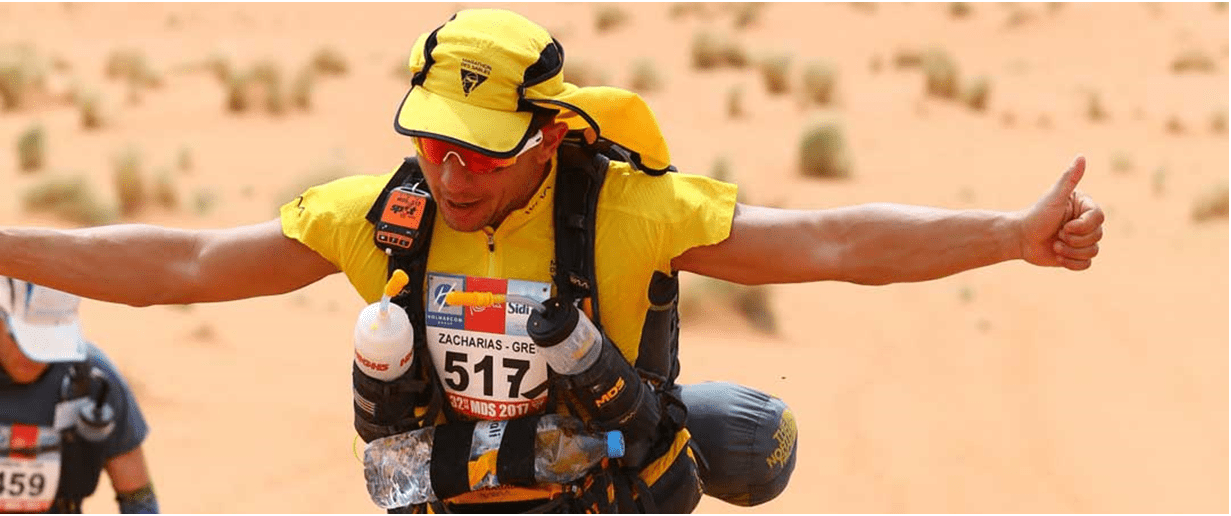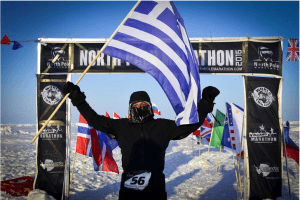“In running I found my way out, it comes as a medicine, as a redemption, as an escape from the daily routine of work and the stress it causes, it is a way of thinking, living and uplifting emotions”… Zacharias Daniilakis is the most representative example of will and determination. Because he is the man who went against the sedentary life and, starting from a simple “flirtation” with running, found himself running the North Pole Marathon, but also running 250 km in 6 days, with 11 kg of equipment on his back and in 40-50 degrees in the middle of the desert.
Interview with Theodolos Papavassiliou
How did your relationship with running start?
I have always enjoyed sports and have been a loyal friend and active member playing soccer, kayaking in rivers, gym, etc.
In 2012, I started “flirting” with running in the company of a friend and best man. Our goal was to run our first marathon and at the time, we said it would be our only one. We were going to run the classic Athens route, what we call “the original marathon”. That is how we started, we thought of it as an unattainable goal, a transcendence that was eventually conquered.
From the beginning, you saw it “warmly”, that is, that you could develop it and deal with it more professionally, or did it emerge along the way?
It emerged along the way and let me make something clear: I and my involvement with running have nothing to do with professionalism. Neither my performances nor my runs even come close to the professionals of the sport, nor have I ever been paid or subsidized by anyone to run. I do it for me, for the euphoria it brings and for my health. In running I have found my outlet, it comes as medicine, as a release, as an escape from the daily routine of work and the stress it causes; it is a way of thinking, living and uplifting emotions.
What was the first great joy you got from taking up this sport?
When I finished my first marathon in Athens in 2012.
And the biggest challenges you encountered?
First, the race at the North Pole, the freezing temperatures and trying to stay at a constant temperature. Then, the endless hours of training on a 700m beach up and down for 5 to 6 hours at a time, so that I could run the super desert marathon, the so-called Marathon des Sables. Finally, the race itself was the most difficult and arduous thing I have ever done: 6 days, 250km, with 11kg of gear on my back and 40-50 degrees in the middle of the desert.
How did your participation in the North Pole Marathon come about? Wasn’t it a risky choice for you?
I was looking for something that would bring me closer to my limits. After all, isn’t that part of life? Pushing the envelope? How else are you gonna grow, how else are you gonna learn? That is how I found the North Pole Marathon. Life has risks every day; I did not think I was taking any by racing at the North Pole. After all, it is a race that has been going on for several years now without an incident. Only this year it did not happen. Due to global warming, the frozen sea is melting and the Barneo camp cannot be set up.
What was that experience like? What has it left you with?
Unique experience, something I will never forget, frostbite, competition, inhospitable to hostile landscape. Sometimes you think you are part of a documentary about mother nature. Solidarity, sports education but also the wonderful taste that finishing with our blue and white flag leaves in your soul. Pride.
What does your “classic” training program include?
Morning strength training with weights, afternoon running workouts and a long stretch of running on Saturday, sometimes on the road, sometimes in the mountains.
What about your diet?
I am as careful as I can be; it is easier for me to be faithful to my training program than my nutrition program. I get what I need from the foods I eat, many small meals every day and plenty of water.
What are your next goals?
I have not set a goal now. I ran a marathon in Prague in May and now I am just maintaining myself. Time will tell.
What advice would you give to all those who want to take up the sport?
To start “yesterday” and do it with the care and advice of a professional coach who will preserve their health and increase their performance in the best and most painless way.



